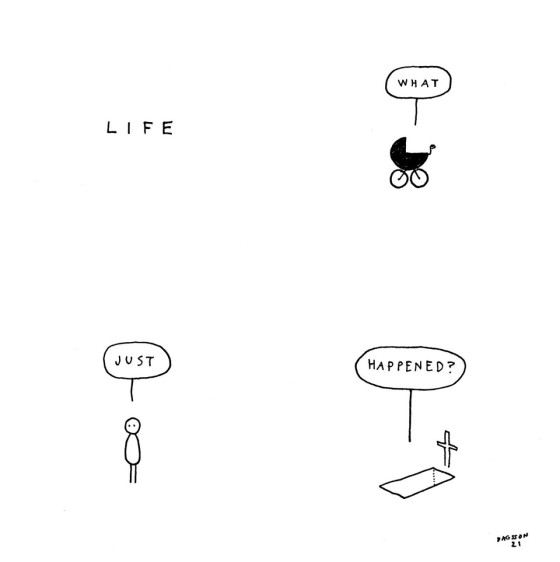2024.05.04
Some of his point is that it's our very finitude that gives meaning to what we are - and our inability to have the infinities we think we want that causes so much misery.
He's kind of a recovered "time management specialist", and another theme is we can never really catch up with our todo lists, because as our accomplishments grow, so do our expectations of what we can do. Become a diligent worker, you'll likely get more work - and the same goes for our expectations of ourselves.
Like me he gets a lot of mileage out of sharing quotes and thoughts from other writers, so here are some pieces that stood out for me:
It's the very last thing, isn't it, we feel grateful for: having *happened*. You know, you needn't have happened. You needn't have happened. But you did happen.
What makes it unbearable is your mistaken belief that it can be cured.
You teach best what you most need to learn.
It's a self-help cliché that most of us need to get better at learning to say no. But as the writer Elizabeth Gilbert points out, it's all too easy to assume that this merely entails finding the courage to decline various tedious things you never wanted to do in the first place. In fact, she explains, "it's much harder than that. You need to learn how to start saying no to things you do want to do, with the recognition that you have only one life."
The struggle for certainty is an intrinsically hopeless one--which means you have permission to stop engaging in it.
"Trying to control the future is like trying to take the master carpenter's place," cautions one of the founding texts of Taoism, the Tao Te Ching, in a warning echoed several centuries later by the Buddhist scholar Geshe Shawopa, who gruffly commanded his students, "Do not rule over imaginary kingdoms of endlessly proliferating possibilities." Jesus says much the same thing in the Sermon on the Mount (though many of his later followers would interpret the Christian idea of eternal life as a reason to fixate on the future, not to ignore it). "Take no thought for the morrow, for the morrow shall take thought for the things of itself," he advises. Then he adds the celebrated phrase "sufficient to the day is the evil thereof," a line I've only ever been able to hear in a tone of wry amusement directed at his listeners: Do you first-century working-class Galileans really lead such problem-free lives, he seems to be teasing them, that it makes sense to invent additional problems by fretting about what might happen tomorrow?
A plan is just a thought.
In his play The Coast of Utopia, Tom Stoppard puts an intensified version of this sentiment [that a good childhood isn't just a way of getting a good adulthood] into the mouth of the nineteenth-century Russian philosopher Alexander Herzen, as he struggles to come to terms with the death of his son, who has drowned in a shipwreck--and whose life, Herzen insists, was no less valuable for never coming to fruition in adult accomplishments. "Because children grow up, we think a child's purpose is to grow up," Herzen says. "But a child's purpose is to be a child. Nature doesn't disdain what only lives for a day. It pours the whole of itself into each moment ... Life's bounty is in its flow. Later is too late."
Time is the substance I am made of. Time is a river which sweeps me along, but I am the river; it is a tiger which destroys me, but I am the tiger; it is a fire which consumes me, but I am the fire.
Finally something he doesn't quote but fits some of his themes:
I'll tell you a secret. Something they don't teach you in your temple. The Gods envy us. They envy us because we're mortal, because any moment might be our last. Everything is more beautiful because we're doomed. You will never be lovelier than you are now. We will never be here again.Still, I wonder if it's more of an attempt at sour grapes. Maybe we shouldn't want to live forever, but often it feels like it would be nicer to have more say in the timing of it all...



